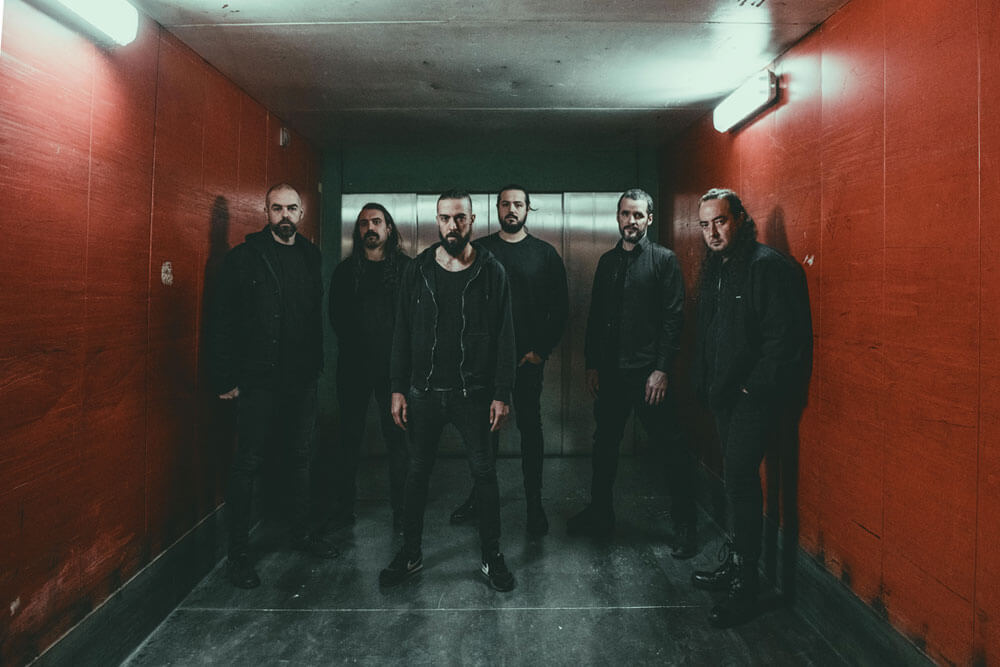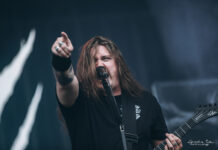We had the opportunity to chat with guitarist Carlos Lozano about PERSEFONE’s latest album, “metanoia,” and get some insight into the inner workings of the band. Check out the interview below:

Hello! How are you doing?
I’m doing great! Thank you so much for having me!
PERSEFONE has been around since 2001 and I’m curious, what are some of your career highlights so far?
It is kind of difficult to recall all of them in such a long period of time like this journey has taken, but if I had to choose some of them, I would highlight events like our first time in Japan, playing Wacken, playing at the legendary Whiskey a Go-Go in LA or working with Paul Masvidal to name a few. We are very grateful for all the wonderful moments we have been able to live because of the band.
As a follow-up, what are your goals going forward?
Bearing in mind the current world situation, I think that being able to resume touring and try to reach people and places we never did before could be the main goal at this point. Other than that, we really would like to keep writing and recording albums and try to improve every aspect of our musical vision as far as we can.
The new album has now been out for some time now. How have the reactions been? Have you been following what people have been saying?
Sure! The reaction has been outstanding so far. People that already knew the band seem to dig the new music, and newcomers to the sound of PERSEFONE are finding our musical approach interesting enough to spend time reacting to it on the internet. There has been a lot of feedback since the album was released and, so far, we are very happy with it.
Since “Aathma” was a critically acclaimed album, what was your mindset going into “metanoia?” What kind of expectations did you put on yourselves for this album?
Our motivation to keep making albums has always been to improve as much as possible between releases. It’s an endless cycle. You work hard on an album, then you release it, and then you see all the mistakes and things we could have done better. Then we have new goals for the next one in order to address all those mistakes, from the songwriting to the recording and even producing or regarding the artwork. Then we work hard again to top it, we release the music again… and then again, we see new mistakes and our goal is to address them on the next one… and so on. “Aathma” was just part of that process, and for some reason people liked it, but that’s outside of our control so, we just keep doing our thing and try to top all the aspects that fall under our control.
Going back to the writing sessions, did you start from scratch or did you bring in ideas and songs that were still in somebody’s archive? What is the dynamic within the band when it comes to songwriting?
We never use any idea from past writing sessions. We spend as much time as possible learning new stuff in between albums. Music theory, new skills on the instruments, new arrangement ideas, production tools… So, when we start writing again, we just try to be in the right mindset and put all that new information to work on the new music. We like to work together, but never more than three people in a room since we want the sessions to be controlled and productive. The environment is pretty tough since we have high expectations for each other but we know that the more we push ourselves on the writing part of the process, the better will be the final result.
When it comes to such complex songs, what usually comes first, the music and the arrangements or the lyrics? Or are there sometimes lyrical ideas that you then write music to?
We usually work on a concept for the album before writing any note. Then we start working on the music, not just songs, but we try to give the album a structure so it makes sense with the concept we want to work with. There are some arrangements we work on while writing the main harmonic, rhythmic, or melodic ideas, but we usually put the effort into that after the music is already done. Lyrics come last since; for us, vocals are just another instrument and especially rhythmically speaking, we need the lyrics to fit perfectly with the music, so we need the music first for that.
Was there a song that gave you a bit of trouble while working on it? Either in the sense that the instrumentals don’t match the lyrics or the cadence, or maybe you had a hard time recording something?
I think that one could be “Anabasis pt.2.” That song was the first one we started and for some reason, we had a hard time by the time we were in the middle of it. We could not decide where to go with it and we tried many different ideas and [none] of them were good enough. Long story short, that actually was the very last song to be finished on this album!
Is there any section in this album that you’re particularly proud of having written or played?
Probably I’m more proud of the other guys’ performances because of the natural insecurities that go together with any musician, but if I had to name some guitar work I always say that my favorite riff is the fast one on the song “Architecture of the I.” I really feel it for some reason.
In my review, I wrote that “the album feels like a 58-minute track divided into ten sections” as “metanoia” has the flow of a concept record. Would you say that is a fair assumption?
Definitely! We like to work on concept records, we like to see every album as a journey, as a story, and that’s the way we treat the music in order to create that specific vibe. The fact that you feel that way makes me very happy, as it means that the album works as a whole. Thank you!
The album properly starts with “Katabasis” and finishes with the “Anabasis” suite tracing the outline of a meltdown. With such a personal concept, how difficult was it to write the lyrics? Or was it more of a cathartic endeavor?
We are human beings, as everyone else, so we try to write about concepts that resonate with us and we feel confident talking about. Writing the whole album has been definitely some kind of “cathartic endeavor” as you say, just because of the complicated nature of putting all those notes together and trying to make some sense out of them. “Katabasis” and “Anabasis” are concepts we have experimented with as human beings, and also by creating “metanoia” for sure.
You have many collaborations on this album and it seems like more and more bands/artists are starting to collaborate these days. Do you think these collaborations are important to expand the fan bases or do you do it to better serve the songs?
A little bit of everything, I guess. We are also fans of many artists, and to be able to collaborate with some of them in something as important for us as is the music is such a huge motivation to continue with the guest musicians. Also, having artists that talented adds a lot of quality to the final product, in my personal opinion.
Arguably, this album is one of your best. Considering the strength that “metanoia” has across all the tracks, what do you think is the biggest strength that the band has today?
I think we are starting to understand how to reach the musical vision we had when we started PERSEFONE. We knew what we wanted to offer with this band, but we didn’t have either the skills or the knowledge to reach that idea. With every album, we have been working hard to get close to that specific vision and with “metanoia” I think it’s a solid step in that direction.
The title of the album, “metanoia,” refers to spiritual conversion and in the press release, you’ve talked about how that translated into the album’s sound. But how does the concept of metanoia apply to you on a personal level? What did you learn about yourself while working on this record?
It is impossible to grow if you are not willing to question everything you think you know. Through working on this concept, I have learned that in order to grow as a human being, we need to walk on the edge when it comes to beliefs and deal with the unbearable insecurities that come with that state. Beliefs are necessary, inevitable, but are also in need to be questioned every day, as hard as it sounds.
Usually, a new album means a new touring cycle. Are there any shows planned so far?
Hopefully, we will tour the EU with OBSCURA this fall, since our tour with them was postponed due to the pandemic. As you can imagine, we are dealing with the world situation the best we can and we want to tour the album as much as possible, but at the same time, we need to be wise with our decisions when it comes to going on the road.
Finally, is there anything else you’d like to share with our readers?
I want to thank anyone that is reading this interview and I want to tell everyone to spend time with your loved ones because sometimes this crazy world we live in makes us get the priorities wrong.
Interview by Andrea Crow





